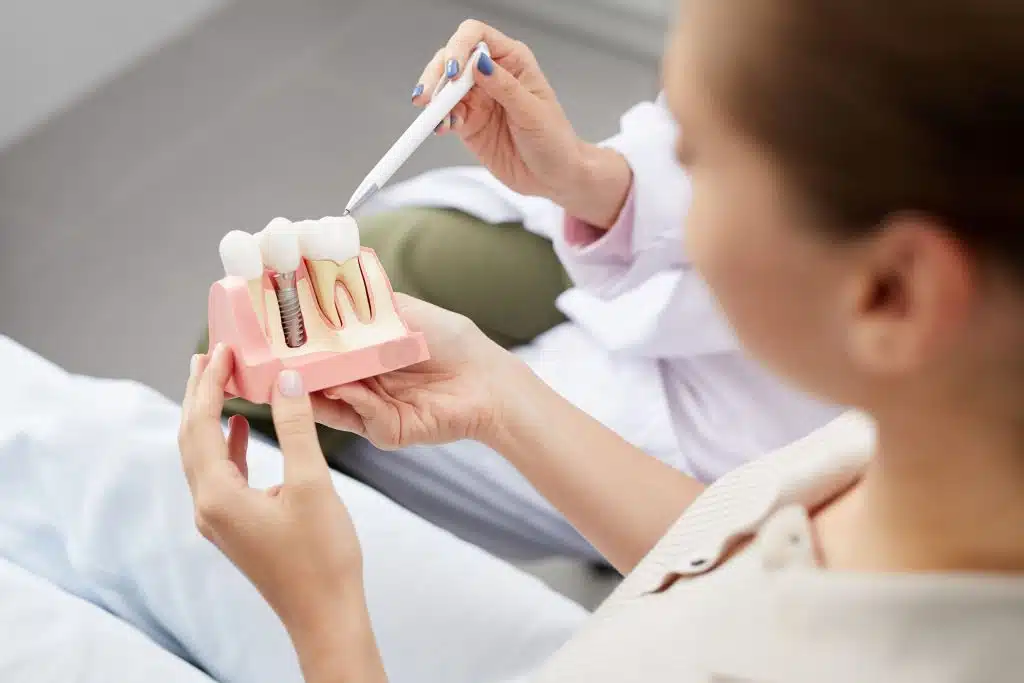Temporomandibular joint disorder (TMD or “TMJ,” as many people call it) is a debilitating condition affecting people all day, every day. Sometimes it can flare up more than others, especially after eating hard, crunchy, or firm-textured foods. Depending on the severity of your TMJ problems, discomfort can range from mild soreness to debilitating pain.
As a practice solely focused on treating orofacial disorders like TMD/TMJ, our San Diego providers help provide efficient and effective relief of TMJ symptoms.
What are TMJ Symptoms Normally Like?
TMJ disorder can present itself in various ways. Some people experience chronic earaches or migraines because of the close proximity to the jaw joints. Others can include clicking, popping, or stiffness in the TMJ itself. A significant joint disorder may even result in a limited range of motion, making it difficult or painful to eat and talk.
Common Causes of TMJ Disorder (TMD)
Bruxism or stress. Chronic teeth clenching and grinding is a condition we call “bruxism.” It’s typically subconscious and happens when we’re sleeping, but some people do it in the daytime as well. Stress—from work, family issues, or other things going on in our life—is a common factor. Certain types of medications can also make a person more likely to clench and grind their teeth.
Traumatic injuries. Automobile wrecks, old sports injuries, or even slipping in the bathtub are enough to damage a joint anywhere in your body. Considering that facial injuries account for a high percentage of traumatic accidents, TMJ problems are more often than most people realize.
Sleep apnea. Did you know that people who have clinical sleep apnea tend to clench and grind their teeth while they sleep? Undiagnosed sleeping disorders typically present themselves as TMJ disorder, jaw pain, flat or worn teeth, and even bite marks inside of the cheeks. Because sleep health and TMJ disorder are so closely related, we can screen for both complications during your intake exam.
Malocclusion. Misaligned teeth and jaws require atypical joint movements in order to break down food for digestion effectively. Although you may be used to chewing your food differently, your TMJ isn’t designed for abnormal motions every day. Aligning your bite through non-surgical, orthodontic intervention (such as clear aligners) may be the most holistic approach to addressing your chronic TMJ pain.
Joint damage. Sometimes, internal deterioration of the TMJ or disc can alter the function of the joint overall. If you’re taking any medications, please let us know. Certain types of pharmaceuticals and medical conditions have been linked with jaw problems.
Treatment Options
The best treatment for TMJ disorders depends on the underlying cause behind your condition. For example, if you’re clenching your teeth tightly at night because of untreated sleep apnea, you would need a different type of therapy than someone whose joint pain is because of their teeth not lining up properly.
There are several different types of TMJ treatment that we utilize to fit the circumstances. For instance, our San Diego providers may need to adjust your bite so that pressure points are evenly distributed throughout your mouth. This can reduce joint pain in as little as one day. On occasion, adjusting the alignment of your teeth may also be recommended.
Oral appliances like nightguards/bite splints and sleep apnea devices can eliminate the tension in your TMJ, thereby removing the source of pain.
Even traditional cosmetic treatments like Botox act as natural muscle relaxers. Although these injectables can take a few weeks to reach their full effects, Botox is a safe and non-surgical alternative for people struggling with chronic TMJ-induced headaches.
Ultimately, our San Diego providers will want to curate an individual care plan based on your unique jaw and orofacial anatomy. There is no one “right” treatment for everyone.
TMJ Treatment in San Diego
San Diego Sleep & TMJ Center offers natural, neuromuscular approaches to addressing the causes of TMJ. If you’re experiencing symptoms of TMJ and treatment is a concern, our San Diego practice can help.
Contact our office today to reserve a no-obligation evaluation and get the answers that you need.


